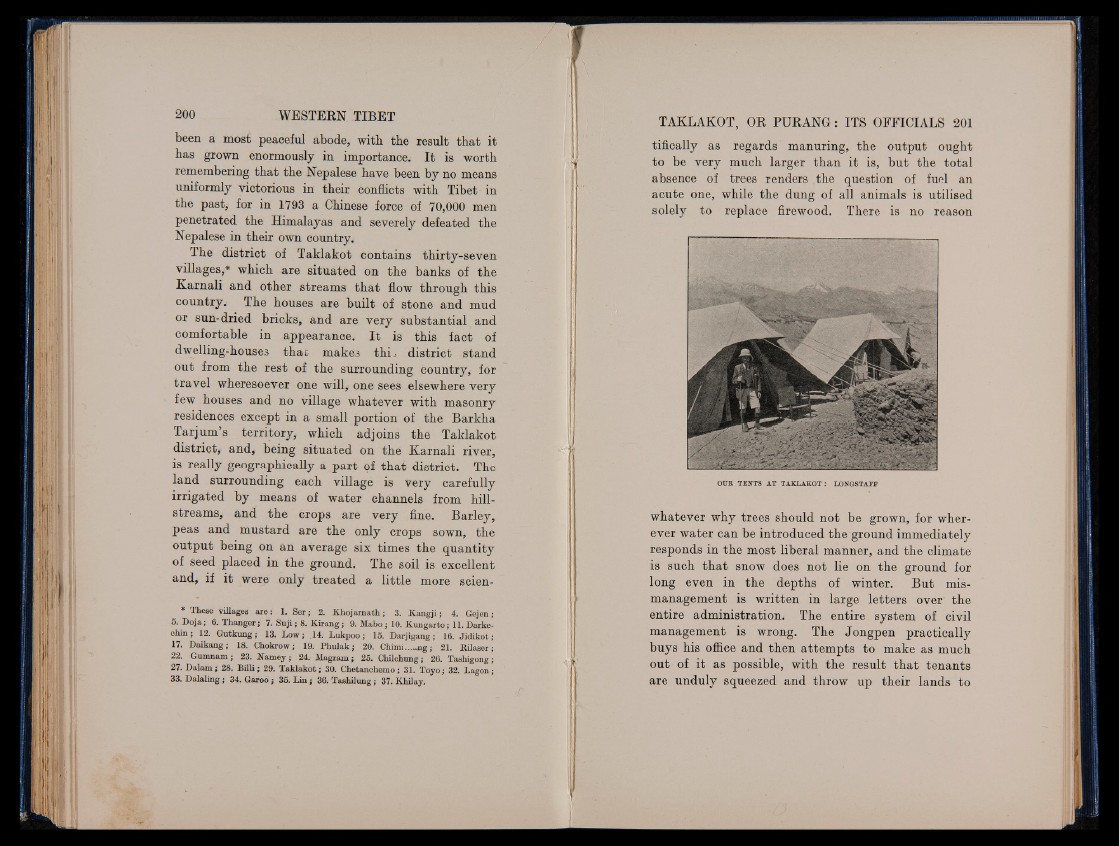
been a most peaceful abode, with the result that it
has grown enormously in importance. I t is worth
remembering that the Nepalese have been by no means
uniformly victorious in their conflicts with Tibet in
the past, for in 1793 a Chinese force of 70,000 men
penetrated the Himalayas and severely defeated the
Nepalese in their own country.
The district of Taklakot contains thirty-seven
villages,* which are situated on the banks of the
Karnali and other streams th a t flow through this
country. The houses are built of stone and mud
or sun-dried bricks, and are very substantial and
comfortable in appearance. I t is this fact of
dwelling-houses thac makes th ij district stand
out from the rest of the surrounding country, for
travel wheresoever one will, one sees elsewhere very
few houses and no village whatever with masonry
residences except in a small portion of the Barkha
Tarjurn’s territory, which adjoins the Taklakot
district, and, being situated on the Karnali river,
is really geographically a part of th a t district. The
land surrounding each village is very carefully
irrigated by means of water channels from hill-
streams, and the crops are very fine. Barley,
peas and mustard aré the only crops sown, the
output being on an average six times the quantity
of seed placed in the ground. The soil is excellent
and, if it were only treated a little more scien*
These villages are: 1. Ser; 2. Khojarnath; 3. Kangji; 4. Gejen;
5. Doja; 6. Thanger; 7. S u ji; 8. Kirang; 9. Mabo ; 10. Kungarto; 11. Darke-
chin ; 12. Gutkung; 13. Low; .14. Lukpoo; 15. I)arj¡gang; 16. Jid ik o t;
17. Daikang; 18. Chokrow; 19. Phulak; 20. Chimi.„^ng; 21. Eilaser;
22. Gumnam; 23. Namey; 24. Magram; 25. Chilchimg; 26. Tashigong;
27. Dalam ; 28. Lilli; 29. Taklakot; 30. Chetanchemo ; 31. Toyo; 32. Lagon;
33. Dalaling; 34. Garoo; 35. Lin ; 36. Tashilung ; 37. Khilay.
tifically as regards manuring, the output ought
to be very much larger than it is, but the total
absence of trees renders the question of fuel an
acute one, while the dung of all animals is utilised
solely to replace firewood. There is no reason
OUR TENTS AT TAKLAKOT : LONGSTAFF
whatever why trees should not be grown, for wherever
water can be introduced the ground immediately
responds in the most liberal manner, and the climate
is such th a t snow does not lie on the ground for
long even in the depths of winter. But mismanagement
is written in large letters over the
entire administration. The entire system of civil
management is wrong. The Jongpen practically
buys his office and then attempts to make as much
out of it as possible, with the result th a t tenants
are unduly squeezed and throw up their lands to